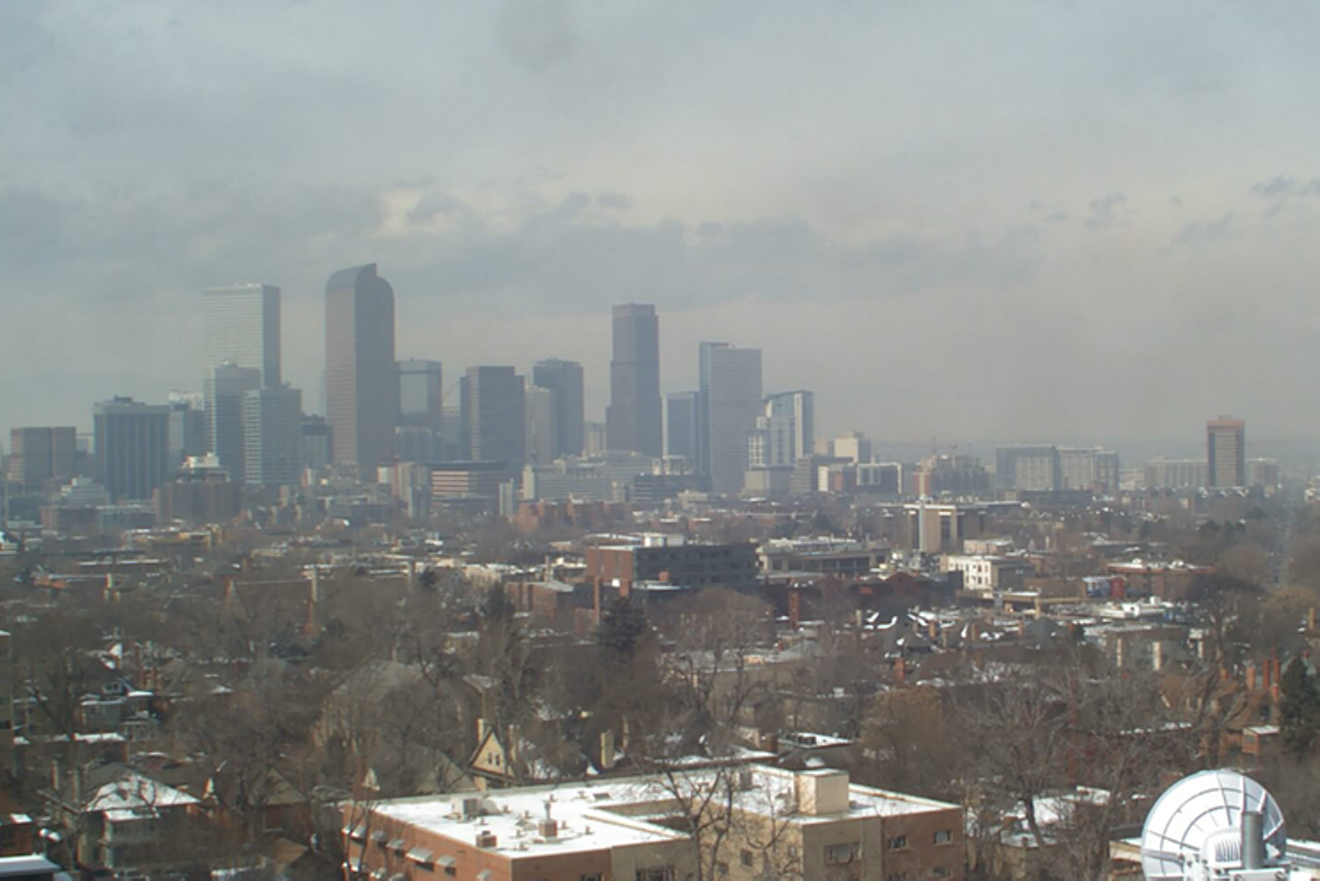Denver's air quality has come a long way since the heyday of the "brown cloud," the thick layer of smog that hung over the Front Range in the 1980s so often that the city became the butt of national jokes. But new research provides further evidence for what environmental advocates and public-health officials have been saying more often over the past few years: After decades of progress in tackling ozone and other forms of air pollution, things are trending in the wrong direction.
The Denver metro area experienced 131 days of poor air quality in 2018, according to a report released today, January 28, by advocacy group Environment America. That's up from the 98 days of poor air quality — defined as days on which at least half the air monitors in the area recorded at least "moderate" levels of pollution on the Air Quality Index (AQI) scale — that Denver experienced in 2016, according to the group's previous report.
In December, officials at the Environmental Protection Agency formally designated the Denver region as a "serious" violator of federal ozone standards, triggering a host of stricter emissions rules that Colorado regulators must now implement. The region's recorded ozone levels of 79 parts per billion (ppb) still exceed both the old federal standard of 75 ppb and a revised standard of 70 ppb set in 2015 — and state air-quality officials haven't made much headway in bringing Front Range ozone in line with those limits.
"Ozone is decreasing, but that decrease is plateauing," said Dr. John Douglas, executive director of the Tri-County Health Department, in a press conference unveiling the new research. "And scientific data is indicating that the previous standard is not low enough."
Ozone is formed in the air by a chemical reaction between sunlight and certain "precursor" pollutants like volatile organic compounds (VOCs) and nitrogen oxides (NOx), which are emitted largely by motor vehicles and industrial pollution sources, including oil and gas facilities. In addition to the 99 days of elevated ozone pollution Denver experienced in 2018, Environment America's report found, it saw 51 days of elevated fine-particle pollution, which originates from many of the same sources, along with others like wood burning and construction dust.
Douglas, whose agency oversees public health in Adams, Arapahoe and Douglas counties, stressed that a growing body of scientific research has linked air pollution not only to asthma, emphysema and other lung conditions, but a wide range of other negative health effects, as well.
"Beyond respiratory issues, air pollution also causes other health problems," Douglas said. "These include heart disease — the number-one cause of death in Colorado — cancer and strokes. We're even learning that bad air quality can contribute to neurological diseases such as Alzheimer's disease."
It's not just Colorado that's dealing with an air-quality backslide; the number of days with poor air quality was up in cities across the country between 2016 and 2018, Environment America's report found. Overall, an estimated 108 million Americans lived in areas experiencing more than 100 days of elevated air pollution in 2018, compared to 73 million two years earlier.
The report outlines a series of policy recommendations to get things back on track, with a particular focus on curbing transportation emissions and encouraging biking, walking and public transit. Activists on Tuesday faulted Republicans like Colorado Senator Cory Gardner for rolling back federal rules on vehicle emissions standards, clean electricity generation and more.
“Instead of undermining clean air protections, Senator Gardner should be taking every opportunity to clean up the air we breathe,” Eric Timlin, an organizer with Environment Colorado, said in a statement. “Since transportation is the most polluting sector of our economy, we need to transition to electric cars, buses and transit.”
[
{
"name": "Air - MediumRectangle - Inline Content - Mobile Display Size",
"component": "12017618",
"insertPoint": "2",
"requiredCountToDisplay": "2"
},{
"name": "Editor Picks",
"component": "17242653",
"insertPoint": "4",
"requiredCountToDisplay": "1"
},{
"name": "Inline Links",
"component": "18838239",
"insertPoint": "8th",
"startingPoint": 8,
"requiredCountToDisplay": "7",
"maxInsertions": 25
},{
"name": "Air - MediumRectangle - Combo - Inline Content",
"component": "17261320",
"insertPoint": "8th",
"startingPoint": 8,
"requiredCountToDisplay": "7",
"maxInsertions": 25
},{
"name": "Inline Links",
"component": "18838239",
"insertPoint": "8th",
"startingPoint": 12,
"requiredCountToDisplay": "11",
"maxInsertions": 25
},{
"name": "Air - Leaderboard Tower - Combo - Inline Content",
"component": "17261321",
"insertPoint": "8th",
"startingPoint": 12,
"requiredCountToDisplay": "11",
"maxInsertions": 25
}
]












